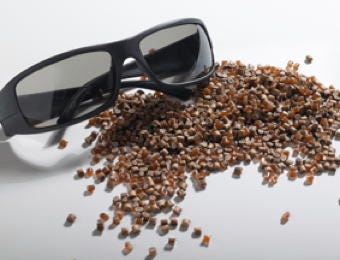Evonik Industries (Essen, Germany) has developed and launched a novel combination of bio-based high-performance polyamides reinforced with bio-based high-performance rayon fibers.
August 16, 2012
Evonik Industries (Essen, Germany) has developed and launched a novel combination of bio-based high-performance polyamides reinforced with bio-based high-performance rayon fibers.
Reinforcing fibers, particularly chopped glass fibers, are often mixed into engineering plastics to improve flexural strength, among other mechanical properties. But in the case of bio-based polymers this results in a lower bio-content, reducing the ecological advantage. The use of natural fibers, on the other hand, has to date resulted in significant deterioration of reinforcing performance, as well as an unpleasant odor in the end product according to Evonik. Vestamid Terra with rayon fibers, however, retains the high bio-content-along with excellent reinforcing potential.
|
Evonik hopes automakers will take a close look at its rayon fiber-reinforced polyamide offerings. |
Two polyamide grades in the Vestamid Terra product family form the polymer matrix: Terra HS and Terra DS. These polyamides are fully or partially obtained from the castor oil plant. Commercially available chopped rayon fibers form the reinforcing fiber substrate. Rayon is also known as man-made cellulose or technically as viscose fibers. These fibers are obtained entirely from wood residues (by dissolving pulp), and are therefore also based on renewable raw materials. The overall bio-content is thus high, ranging between 67% and 100%.
Compared with fiberglass reinforced systems, the combination of viscose fibers and polymer matrix offers a significantly improved carbon balance. As an example, CO2 savings for a viscose fiber system of PA1010 with a fiber content of 30% are 57% higher than for a 30% glass fiber-reinforced PA66.
Additionally, viscose reinforcing fibers have a significantly lower density than mineral fibers: Depending on fiber content, bio-polyamides reinforced with viscose fibers offer a weight reduction of up to 10%, for the same reinforcing performance.
"With this product development, we want to further support the unrestricted expansion of bio-based products in technically demanding applications for our customers," says Benjamin Brehmer, business manager biopolymers at Evonik. —[email protected]
About the Author(s)
You May Also Like



